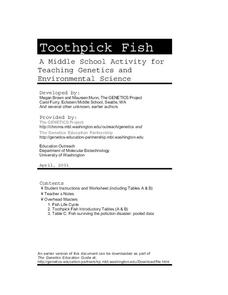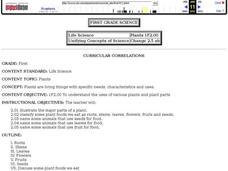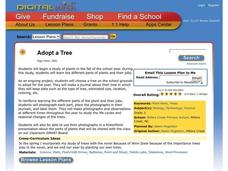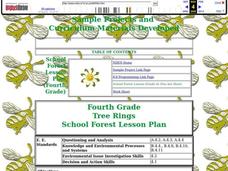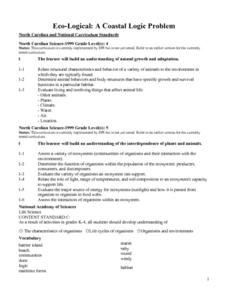University of Washington
Toothpick Fish
With colored toothpicks representing genes, youngsters practice passing them through generations of fish and learn about heredity. Consider this as an introductory activity since it does not represent recessive genes with lowercase...
Curated OER
Plants
Learners illustrate the major parts of a plant, classify some plant foods we eat as roots, stems, leaves, flowers, fruits and seeds. They also name some animals that use seeds, leaves, and fruit for food.
Curated OER
Where Do Your Veggies Grow?
First graders investigate the origins of vegetables. In this Science lesson, 1st graders identify where fruits and vegetables come from. Students describe how people utilize plants.
Curated OER
Sunflowers (Grades 3-8)
Students examine sunflowers and discuss the importance of sunflower cooking oil and seeds. They view pictures, read books, sing sunflower songs, and grow flowers from sunflower seeds.
Curated OER
Adopt a Tree
Students adopt tress on their school campus for scientific observation purposes. In this tree science lesson plan, students adopt a tree at their school, observe the season changes for the tree, and create a PowerPoint presentation about...
Curated OER
WET Science Lesson #11: How Light Affects Water
Scientists listen to the story of Wadja Egnankou who works to save African mangrove forests. They experiment with refraction and the introduction of particulate matter to water. They conclude with creative writing about the need for a...
Curated OER
Land Use Issues
Students discover seeds are a source of life. They also label the parts of a seed and examine the conditions which are needed for the seed to start growing. They follow the life cycle of seeds.
Curated OER
Plants -- What Are Their Parts and Functions?
Middle schoolers identify the parts of a flowering plant and their functions. They describe its life cycle as well. They compare the parts of the plant to the roles that are needed in a democracy.
Curated OER
This Is Tree-rific!
Third graders view a clip of the video Backyard Safari, "Trees," and portray the life cycle of a tree. They also view a clip on structures of a tree and draw a diagram of a tree in their science journals.
Curated OER
Seeds and Similarities
Students use the scientific inquiry method to identify the changes in a plant's life cycle. In groups, they plant different types of plants and use a chart to compare and contrast their growth rates. They share their conclusions with...
Curated OER
Teaching Biology Through Problem-based Activities
Learners plant seeds and observe the life cycle of the organism. They experimentally research the effects of radiation on seed growth. Students determine the effects of environmental pollutants on harvested seed.
Curated OER
Violets, Daffodils, Roses and Thorn
Fourth graders complete a variety of exercises and activities surrounding the scientific and artistic properties of the parts and processes of a plant/flower.
Curated OER
Critters of the Water
Young scholars examine different organisms in various marine habitats. They identify any adaptations that have allowed the organisms to survive. They develop an imaginary organism and describe its life cycle.
Curated OER
Butterfly
Students use a purchased kit to explore the characteristics and life cycles of several butterflies including the Monarch, Western Swallowtail, Red Admiral and Painted Lady. They create a plaster casting of each species for study and...
Curated OER
Seed Surprises
Learners investigate seeds and their growth. In this agriculture lesson, students read the book How a Seed Grows and discuss the seed cycle. Learners examine real seeds and identify their properties. Students create a set of sequencing...
Curated OER
Sunflower Sundance
First graders study sunflower plants and identify its parts. They plant sunflower seeds and watch them grow and make sunflowers out of paper plates and colored paper. They watch videos and visit websites about sunflowers.
Curated OER
Mutualism and Co-evolution A study of Flowering Plants and their Pollinators: Biology, Plants
These lessons use a variety of methods and approaches to teach flowering plant biology which includes seed germination; plant growth and food production through photosynthesis; plant transpiration and respiration; sexual reproduction...
Curated OER
In a Giants Garden
Students explore the effect of the earths rotation and its relationship to the suns position and the effect that the longer and shorter amount of daylight has on a pumpkin plant which they have planted.
Curated OER
Tree Rings
Fourth graders explore tree rings. In this plant biology lesson plan, 4th graders construct a KWL chart on tree rings and examine real tree rings. Students identify the changes that happened during the tree's life and its actual age....
Curated OER
Crickets on the Hearth
Learners investigate how crickets behave in cold temperatures. In this life science instructional activity, students explain the beneficial and harmful effect of pests. They research ways to properly manage them.
Curated OER
Eco-Logical: A Coastal Logic Problem
Fourth graders study the characteristics of five coastal communities. They use logic cards and matching activities to identify the proper community for plant and animal species.
Curated OER
Compost Columns
In this unit of lessons, middle schoolers examine the role of compost columns and recycling. They create a KWL chart about garbage in Chicago. They also examine life cycles and packaging of everyday products.
Curated OER
How do plant & animal cells make and use energy?
Middle schoolers show the relationship between the need for plants to undergo photosynthesis in order to generate oxygen. They see the flaws associated with this thinking because of the lack of CO2 and H2O and lack of sufficient gravity...
Curated OER
Diurnal Cycling Experiments
Learners carry out an experiment to monitor diurnal fluctuations in dissolved oxygen, carbon dioxide, pH, and water temperature. They determine the CO2 and pH of the samples (and optionally, dissolved oxygen). Students complete their...
Other popular searches
- Life Cycle Desert Plants
- Life Cycle of Plants
- Plant Animal Life Cycles
- Plant Lifecycle
- Life Cycles of Plants
- Flowering Plants Life Cycle
- Plants Life Cycle
- Life Cycles Flowering Plants
- Plant, Animal Life Cycles
- Science Life Cycle of a Plant
- Life Cycle of Florida Plants
- The Life Cycle of a Plant


